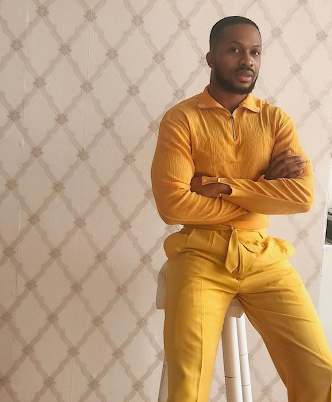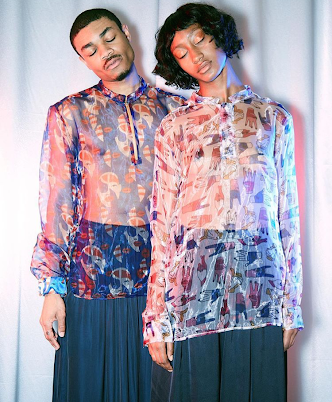
Today, I am featuring “Orange Culture’s” Creative Director, Adebayo Oke-Lawal, a Nigerian Unisex Designer and Philanthropist. Sources caught up with Adebayo Oke-Lawal for an in depth interview.

Tell us a little about yourself, Who is the man behind the brand?
As a kid I use to draw in all of my school books, I use to sketch because I just loved the idea of putting clothes on people and seeing how clothes affects people’s emotions and their perception of themselves. At the age of ten I got my first invigorating experience when I was advised to send my sketches to a local seamstress who was excited to bring my designs to life, that experience was a pivotal moment for me. By the time I was ready to advance my education there really wasn’t any fashion schools in Nigeria so I decided to go to school for finance while taking up several internships with newspapers, backstage at several fashion shows and magazines. These internships helped me learn different aspects of fashion and just understanding the behind the scenes of the industry. I’m very passionate about confronting stereotypes and speaking to those who have been victimized, bullied or oppressed which is where my passion has sort of linked into the brand. Orange Culture came from the idea of embracing your uniqueness and individuality and never allowing stereotypes to box you into becoming something that you are not.


Did you grow up in an expressive household?
Growing up in a white collar home my father was a very fashionable man who actually attempted to go into the fashion industry in his younger years but it didn’t work out for him so he decided to pursue other endeavors. So I guess I got my creative side from my father which I will admit was kind of scary for him seeing me going into this industry because he was fearful that history would repeat itself, but after seeing the success of the brand he has eventually came around which has by far been my proudest moment. He now even adds his input on certain things (laughs).

When did the birth of “Orange Culture” come into fruition?
When I started Orange Culture I just knew that I wanted a brand that wasn’t what anyone was doing. When I initially started my brand all of the other menswear brands in Nigeria were very hyper masculine, clothes that only the “alpha male” would want to wear. I remember launching my first collection which started so much controversy, I received emails from people like “Why would you do this?” “What is this trash?” the backlash was crazy! Despite all of that I just knew that I wanted create something that affected change in an impactful way. At the time I felt like the messaging behind the menswear industry and masculinity in Nigeria (and the black community in general) was only perceived in one rigid way. Growing up in this society men were always told to hide our emotions and vulnerability meant you were weak. I never understood why men weren’t able to connect with their sons, brothers and friends in an expressive and healthy way. We were never told the power of expressing our emotions and that messaging is destructive. Therefore I created a brand with the hopes that it will push men to connect with their emotions and inspire them to look into themselves. I know growing up for me I wasn’t the most masculine of all boys so I was often bullied and oppressed therefore I wanted to use my pieces to have those hard conversations. Some of the themes of my past collections has centered around bullying, young boys being abused, you know topics that people don’t want to go into but are experiencing in reality.

Would you consider Orange Culture to be a unisex brand?
The brand is androgynous/unisex, we created a brand that is not only for men but is also for women who are different. We wanted to create a brand that every women would want to have in their closets even though it is menswear. So if you notice we shoot the collections on men but a lot of women wear our pieces. We are eventually going to launch a full on womenswear brand but still the women’s pieces will remain androgynous as well as the men’s pieces. We want the women’s collection to be the twin of our menswear brand, it won’t be all dresses it’s going to be for the women who are looking for something edgier with lots of flavor, cuts, fluid shirts, prints and fun.

What do you have in store for the future of Orange Culture?
What we are really focusing on is exporting the brand meaning we want to expand outwards and strengthen our presence in the American and European market. We want to start having pop up shops here and there, showrooms and fashion shows to cater to that market. We really want to take our story outward and color the world while educating others on the misconceptions about what is happening back here in Africa. I really just want to create a Nigerian global brand that will outlive me beyond my years.


How do you feel African/Nigerian culture has influenced fashion?
I think that globally Nigeria and other countries in Africa has definitely had a huge presence & influence with a lot of brands. I feel like from ages past there has always been an influence of African culture. Our culture is so rich and exciting and I feel like black people as a whole have such a rich knowledge of culture & a rich vibrance in the way we express ourselves, it’s hard for anyone to not see us. We look at brands like Stella McCartney, Valentino, so many brands have tapped into our culture and used our references without correctly referencing us. That’s why it is so important for us as people to tell our stories whether its in fashion, movies, or writing because for so long we have allowed people outside of the culture to tell our story for us which has almost oppressed us into believing what we are not about ourselves.

What advice would you give a young aspiring designer or creative living in Africa but doesn’t quite know where to start?
One thing I would always tell a young aspiring creative is to make sure you are really passionate about fashion because the hurdles are really high. It’s not an easy road, it may look fabulous but it is a lot of work and you just have to really believe in yourself. You also have to know who you are because fashion is one of those worlds where if your not careful you will be forced to just fall in line and become a replica of something that your not. You have to be ready to stand up for yourself and believe in your story but most importantly you have to believe that your voice is important because no matter what your voice is someone needs to hear you and if you are not strong in it someone will pick up your story and tell it for you. Also be nice to people sometimes fashion has this illusion that you have to be mean to get ahead when in all actuality just being nice will open so many doors.

Where do you see Orange Culture in ten years?
Orange Culture in ten years (laughs) I hope, no I don’t hope, I know that we will be everywhere in the world selling where people can come and touch Orange Culture, see the story behind the brand, give it to the world and let the universe except it for what it is. I just hope that in ten years we would have accomplished more than I can even imagine.

Learn more about Adebayo Oke-Lawalon on Instagram @orangecultureng and be sure to check out his latest collection.
What do you think?
No comments:
Post a Comment